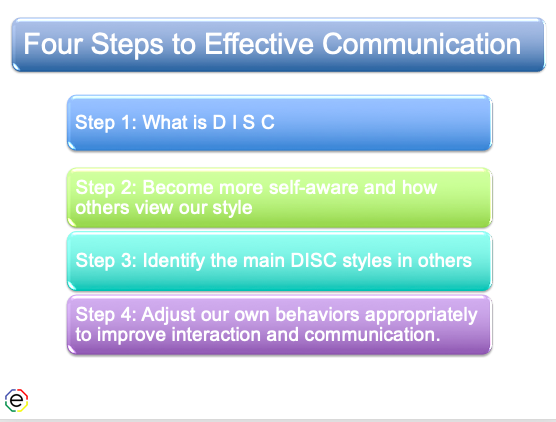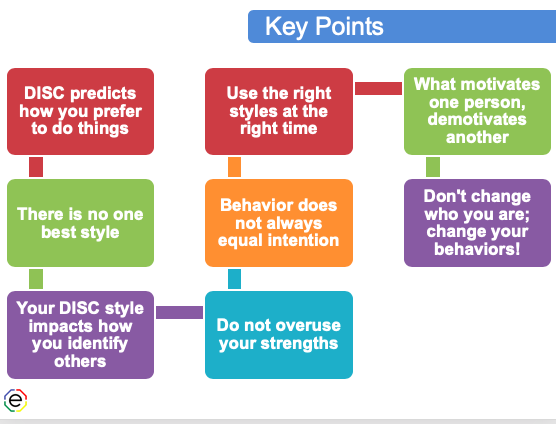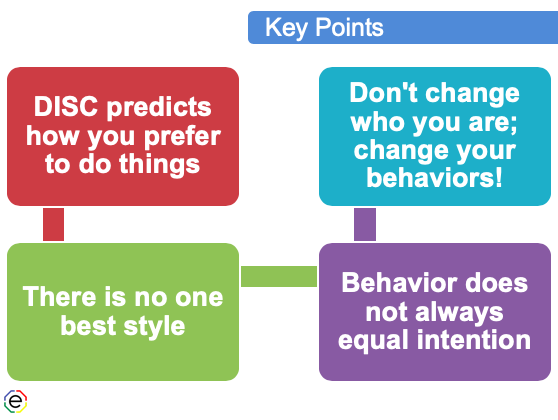You've likely heard of the KISS approach(Keep it Simple Stupid) to doing many things. While we're clearly NOT stupid, we can all benefit from a more straightforward approach to using DISC.
The KISS approach is a design principle adopted by the U.S. Navy in the 1960s to build military jets. There are variations of what KISS stands for; other common meanings are 'keep it short and simple' and 'keep it simple and straightforward'. However you choose to define KISS, the concept remains the same; focusing on simplicity and avoid over complication.
Why Use KISS approach to DISC?
 The KISS principle states that systems tend to work best if they are kept simple, rather than made complicated. It sounds completely logical, right? However, in our desire to instill learning and ingrain the message, we may lost the application piece.
The KISS principle states that systems tend to work best if they are kept simple, rather than made complicated. It sounds completely logical, right? However, in our desire to instill learning and ingrain the message, we may lost the application piece.
Simplicity is the key principle to understanding the DISC model and keeping DISC in practice. The easier something is for your clients to understand and use, the more likely they will adopt and build it in to what they do daily. Once they've seen the benefits of using it, it is more like to become part of their everyday interactions. Your clients are already off to a strong start; one of the strengths of the DISC model is in its simplicity of identifying 4 main DISC styles.
The 4 Steps to Effective Communication
 Oftentimes, the hardest part to build into trainings is the application piece; how to apply what you've learned. The 4 Steps to Effective Communication approach to DISC training follows the KISS design. It has the application piece built in insuring your clients will reap the rewards and benefits of DISC. The 4 Steps approach can be tailored to any audience including sales, leadership, etc. You have a simple template at your disposal to build your DISC workshops.
Oftentimes, the hardest part to build into trainings is the application piece; how to apply what you've learned. The 4 Steps to Effective Communication approach to DISC training follows the KISS design. It has the application piece built in insuring your clients will reap the rewards and benefits of DISC. The 4 Steps approach can be tailored to any audience including sales, leadership, etc. You have a simple template at your disposal to build your DISC workshops.
In addition, Extended DISC® materials are founded on the 4 Steps. Most importantly, the Extended DISC® Assessments are built on the 4 Steps. The continuity of the 4 Step approach throughout the training spectrum is designed to consistently reinforce DISC to your participants and to make your job as a DISC trainer easier.
Quickly in review, the first step of the 4 Steps approach is identifying the 4 DISC styles and understanding the DISC framework. The second step is to become more self-aware of our own style and how we are perceived by others. Step 3 is one of the strengths of the DISC model. It focuses on how to identify the main style of others. Finally, all steps are designed to lead to Step 4. Step 4 builds in the application; how do we adjust our behaviors effectively to improve our interactions?
So, how do we deliver the 4 Steps in a simple and straightforward way? First, we need to identify key objectives for the training.
Simple Takeaways for DISC workshops

When designing or conducting a training, the first question we ask should be, "what are the objectives?" In short, we need to first identify the takeaways for the session before delivering it. Here are some simple takeaways we'd want our participants to know.
- DISC predicts how you prefer to do things.
- There is no one best style; all styles have strengths and all styles have development areas.
- Your style impacts how you identify others. Our personal lenses color how we see the world.
- We tend to get into trouble when we overuse our strengths. We can exhibit the negative traits of our DISC-style when we overuse them. Our strengths have now become our liabilities.
- Using the right style, or situational awareness, gives you the ability to adjust to the best style at the right time.
- Behaviors does not always equal intention.
- What can be motivating for us can actually be demotivating for another style.
- Don't change who you are; change your behaviors!
If you're feeling overwhelmed by too many points, we can simply it further!
Narrowing down key takeaways

Remember your audience; you don't overwhelm your more reserved S-styles and C-styles or lose the interest of your active D-styles and I-styles! So, in the spirit of KISS, we focus on just 4 of the key points listed above. Again, simpler can be better!
The first point is focusing on how DISC predicts how you prefer to do things. You can think of your DISC Assessment as a road map. It helps you understanding how you tend to do things. Now, you can make decisions on where your style works and where you can proactively practice or be more consciously aware of situations where an adjustment would be more effective.
DISC gives no value judgments. There is no best style. All DISC styles have strengths and all have areas of development. The DISC assessment cannot predict success. It does not know your experience, attitude, skills, values, or intelligence.
Behaviors does not always equal intention. We cannot always guess intentions of others. The only thing we can see are their behaviors. For example you may feel the need to attentively listen during your team meetings, but others may see you as disinterested or not actively participating.
DISC focuses on behaviors because they are something we can make adjustments to be more successful. Most of these adjustments are often brief and temporary. The goal is not to fix you; you are not broken. Don't change who you are; change your behaviors!
KISS and DISC: next steps
Life is really simple, but we insist on making it complicated — Confucius
And for all scenarios, try to keep it as simple as possible. This is the hardest behavioral pattern to apply, but once you have it, you'll look back and say, "'I can't imagine how I was doing it before'.
The bottom line is you don’t need to reinvent the wheel when it comes to resources and information in your DISC trainings when it's already there for you. Of course, adding your own personal stories and observations is always a game changer.
Even though we’ve applied the KISS approach to DISC, remember, it still takes practice!

